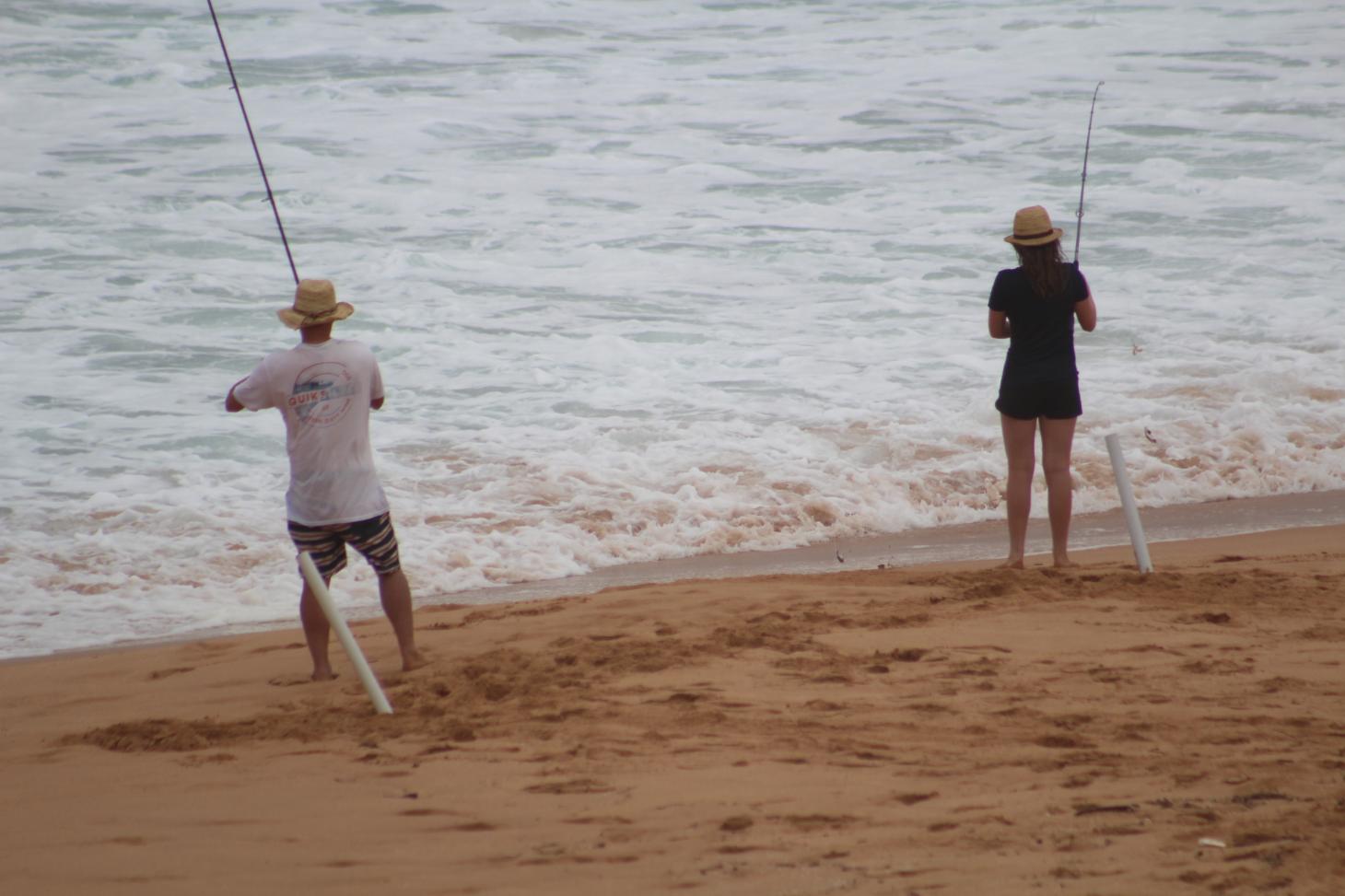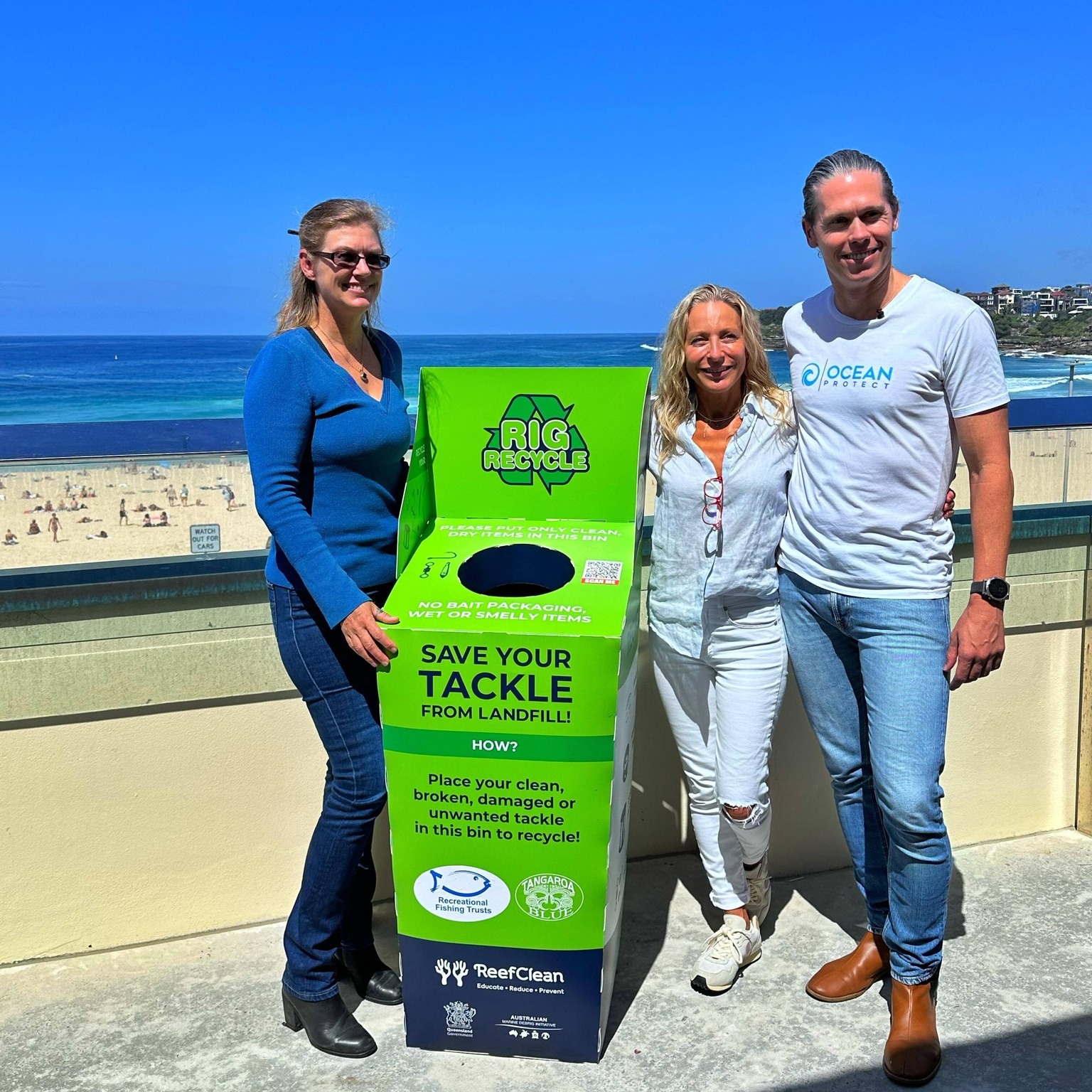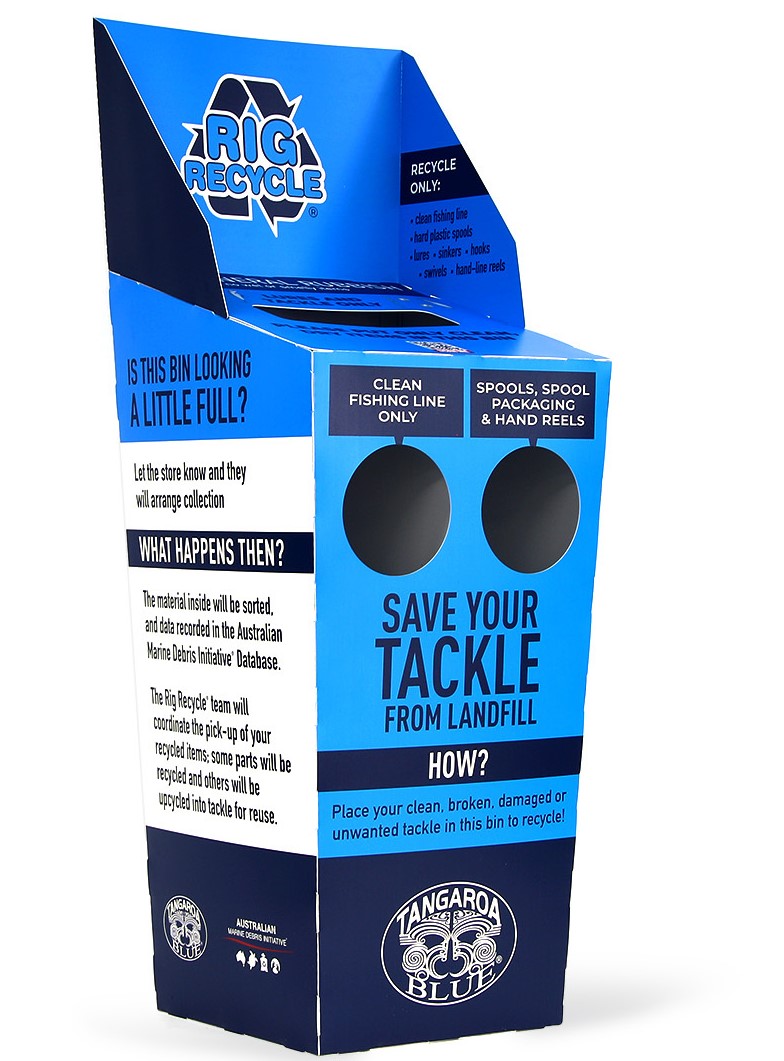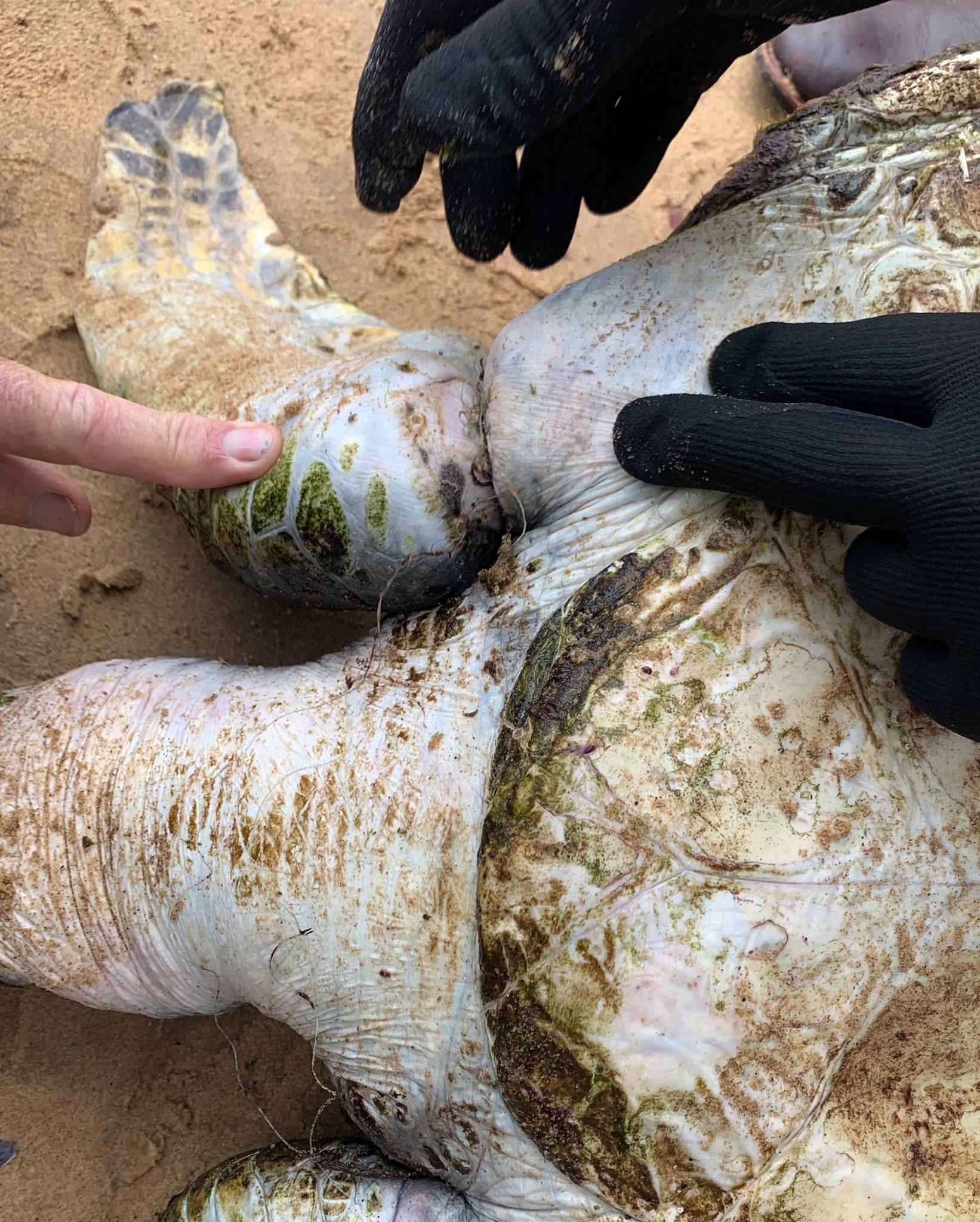Rig Recycle Launched In NSW: Leave Your Fishing Line + Old Rigs In These Recycling Bins - Save Our Local Seabirds & Turtles

Rig Recycle was developed and trialled as part of Tangaroa Blue Foundation's ReefClean program, removing and preventing marine debris and litter impacting the Great Barrier Reef.
The aim is to divert specified recreational fishing items and packaging accessories from becoming litter in the environment or being disposed of in landfill by changing the recycling behaviours of consumers and retailers.
The Rig Recycle program is an Australian-first program that collects selected recreational fishing and packaging items and diverts them from landfill through an innovative repair, reuse and recycle framework. The project connects recreational fishers, community clean-up participants, recreational fishing retailers and suppliers, social enterprises and community partners in a holistic and truly circular program that fills a current recycling gap.
The NSW launch took place as part of the Volvo Ocean Lovers Festival at Bondi, March 15-19, 2023 with Heidi Tait from Tangaroa Blue Foundation taking part in the Ocean Plastic Action Forum on March 15, speaking about the initiative and the work of the Foundation. The Ocean Plastic Action Forum was a one-day special event filled with interactive panel discussions providing valuable insights into the impact of ocean plastic pollution, delving into the science and issues surrounding ocean plastic, exploring current innovation and reviewing future solutions to purge plastic from our ocean.
CEO, Heidi Tait travelled to Bondi to take part in panel discussions at the Ocean Plastic Action Forum. Along with other industry professionals, they discussed the current state of plastics in our oceans and what is currently being done to reduce the impact on our oceans.

This was also a great opportunity to showcase the Rig Recycle bins that are currently rolling out across NSW as part of a NSW Recreational Fishing Trust grant. Heidi is pictured here with Anita and Brad with thanks to them and the organising team for supporting the NSW launch. This is the first version of the Rig Recycle bin - new improved one below. Photo: RigRecycle
How does it work?
- Take your recreational fishing items to a Rig Recycle bin near you
- The items get collected, audited and entered into the Australian Marine Debris Initiative (AMDI) Database
- The items are either repaired for reuse or recycled
What can you put in the bin?
- Fishing line
- Plastic line spools (that you buy your line on)
- Handline spools
- Hooks - preferably in good condition (not rusty)
- Sinkers - lead or other, in any condition
- Swivels - preferably in good condition (not rusty)
- Lures
- Floats
What can't go in the bin?
- Bait packaging, or any other smelly item
- Soft plastic packaging, recyclability is variable
- Soft plastic disposable body/tail
- Rods and reels
- Life jackets
- Flares. These should be disposed of appropriately - see your State or Territory guidelines
You can also download the Recycle Mate app, put in your location and the item and it’ll tell you where to recycle it!

What we learnt in our initial Rig Recycle trial, was that having one hole in the bin meant everything ended up getting tangled in one big mess that took a fair bit of time to separate for repair, reuse and recycling. That led to the brainwave to create three separate compartments in our new bin design! Packaging items like spools go into one compartment, fishing line into another, and smaller items like hooks and sinkers go into the third one on the top. No more tangled mess; So please check out the labels on each of the compartments when dropping off your Rig Recycle gear.
Why is this so important to my fishing?
Fishing can produce a lot of waste, but this initiative helps reuse and recycle as much as possible to keep your fishing gear circulating and out of landfill. Responsible fishers love their local environment and reducing waste is just another way they are getting involved in looking after it.
DID YOU KNOW – Data from the Australian Marine Debris Initiative Database shows that fishing line makes it into the top 10 items found during clean-up events, with over half a million metres removed from over 4,000 clean-up events. That’s an average of 125m of line from every clean-up event around the country! RIG RECYCLE will reduce that number with 1,000s of recreational fishers behind the initiative.
How it all started
When the “Look After your Tackle” campaign was launched to reduce recreational fishing litter in 2020 as part of the ReefClean program, the Tangaroa Blue Foundation also identified that there was no recycling program available for recreational fishing items and their single-use packaging.
It seemed like a natural progression for the Tangaroa Blue team to work on finding a solution that would divert recreational fishing items either collected from clean-up events, or that fishers were looking to dispose of, from ending up in landfill.
So the Rig Recycle program was developed!
Starting as a trial using data submitted from clean-ups into the Australian Marine Debris Initiative Database, as well as feedback from recreational fishers and retailers, the need for the Rig Recycle collection and recycling system, that was able to accept not just marine debris items and broken and unwanted fishing gear, but also single-use packaging items from within the recreational fishing industry like fishing line spools and hard plastic tackle packaging, was identified.
The Rig Recycle program, in its collection infancy, had 5 major goals which seek to ensure best practice across the entire supply chain and design processes:
Recover - of fishing litter reducing environmental harm through the Look After Your Tackle campaign.
Reuse – the reuse of recovered and unwanted items for a second use.
Repair – through a network of recreational fishing organisations, items were it can be repaired, giving them a second life with social fishing charities.
Recycle – all hard plastic recovered in the collection will be diverted to a circular recycling framework, providing recycled feedstock for new products, which themselves are recyclable through the Rig Recycle program.
Reduce - by providing data from the collection program the types of material used in recreational fishing industry equipment and packaging can form staged goals for increasing their recycling feedstock content, designing better packaging solutions, replacing virgin materials and investing in local manufacturing solutions.
The NSW Rig Recycle project is supported by the NSW Recreational Fishing Trusts, which provided a grant - the project is being delivered by the Tangaroa Blue Foundation.
Rig Recycle: Leave your fishing line + Old Rigs in these reccyling bins
So: if you are you tired of seeing fishing gear and packaging waste end up in landfill (or killing local seabirds and turtles) put in your nearest RigRecycle Bin.
Rig Recycle is the first Australian initiative that collects recreational fishing and packaging items and diverts them from landfill through a repair, reuse and recycle framework.
In partnership with Recycle Mate, they've made it even easier to recycle your fishing gear waste! Simply search for your nearest Rig Recycle bin on their app.
Don't have one at your local fishing store? Let them know and they will reach out to them themselves.♻️
To find out where your closest Rig Recycle bin is located or to submit an expression of interest to host a Rig Recycle bin, visit: www.rigrecycle.org
About The Tangaroa Blue Foundation
Tangaroa Blue Foundation is an Australia-wide not-for-profit organisation dedicated to the removal and prevention of marine debris: one of the major environmental issues worldwide.
To successfully solve the problem, we created the Australian Marine Debris Initiative (AMDI), an on-ground network of volunteers, communities and organisations that contribute data to the AMDI Database, and then work on solutions to stop the flow of litter at the source. The AMDI helps communities look after their coastal environment by providing resources and support programs, and collaborates with industry and government to create change on a large scale.
In Maori and Polynesian mythology, Tangaroa is the god of the ocean. Tangaroa made laws to protect the ocean and its sea creatures “Tiaki mai i ahau, maku ano koe e tiaki”… If you look after me, then I will look after you…”
One of our co-founders was a New Zealander with close family connections to a Maori Kaumatua (elder). We consulted him and his whanau (family) and a Maori artist in Wellington about why we wished to call this organisation Tangaroa Blue. This revolved around the group’s strong connection with the marine environment and the need to promote a philosophy explaining that humans can’t keep taking from our ocean environment without giving back just as much. This is our way to give back! We received their blessing to use the name, which is applied with the utmost respect and the understanding that all our oceans are connected. Across the oceans we must work together on protecting our environment for future generations. Our New Zealand co-founder sat on our Board of Directors for 10 years. Our current Board of Directors Chair is a New Zealander with a strong commitment to Indigenous people and many years’ experience working with Iwi Maori in Aotearoa.
Tangaroa Blue has previously operated in Taranaki, New Zealand and always welcomes new initiatives. We have strong connections and partnerships across the South Pacific with communities in the Cook Islands, Hawaii, Fiji, Vanuatu and PNG all using our resources, methodologies and database to work on the marine debris issue.
We work very closely with Aboriginal and Torres Strait Islander people, who also connect with the laws and lores of Tangaroa and strive to build a relationship between healthy freshwater and saltwater country and healthy communities.
Correct pronunciation is an important way of conveying respect for other languages. The vowel sounds in Maori are long, so that Tangaroa is pronounced more like “tongue-a-roar-ah” as the Tangaroa is an or/aw sound as opposed to an ‘oh’ sound that you get with the word ‘row’.
Current Managing Director / CEO / Founder is Heidi Tait
Heidi’s love for the ocean comes from 20 years as a scuba diving instructor. In 2004 Heidi co-founded the Tangaroa Blue Foundation and the Australian Marine Debris Initiative as a way of not only removing the ever-increasing loads of rubbish in our oceans, but more importantly finding ways that prevented marine debris from being released in the first place. Her mantra is “if all we do is clean-up, that’s all we’ll ever do”.
Heidi has been sitting of the Board of Directors since the organisation started in 2004 and is contracted outside of her role on the Board to oversee the administration and day to day operations of the organisation as well as assist in strategic direction and partnerships. Heidi was named one of the “18 Most Influential Women in Ocean Conservation” in the July 2018 edition of Ocean Geographic.
Find out more at: https://www.tangaroablue.org/

- plastic bags and other waste, which the turtles mistake for jellyfish
- cigarette butts
- fishing lines and hooks
- boat and propeller collisions
- entanglement and drowning in nets, ropes, floats or traps
- habitat destruction
- poor water quality and seagrass depletion
- deliberate acts of cruelty
- disease
- appropriately dispose of your rubbish
- collect litter on or near the waterways
- when boating, travel slowly over seagrass beds
- report people engaging in illegal netting or trapping
- help in coastal health projects (e.g. seagrass monitoring)
- join your local animal rescue and care group
- report sick or injured turtles to your local NPWS office.